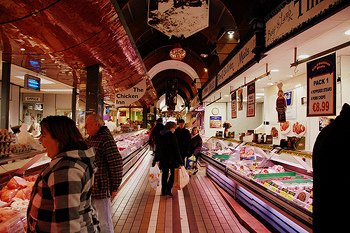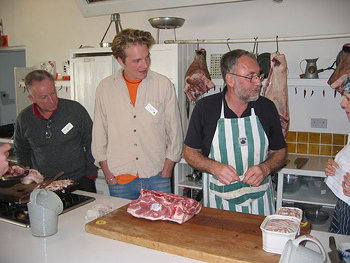
Foodies, take note. There is a secret little corner of Ireland that is a true foodie paradise. I know what you’re thinking: Ireland? A foodie paradise? But this traditionally non-culinary country is learning the ropes with food, a movement that has started in the southern city of Cork.
It’s not the first time in Cork’s history that the county has gone against the grain. In fact, Cork’s, shall-we-say, independent spirit has earned it the colloquial title of “Rebel County,” so it stands to reason that the crazy Corkonians would get on the food bandwagon before the rest of this rather traditional nation.
Believe it or not, the Cork food scene goes back a ways.
All the way, in fact, to the 1700s, when the area was a hotbed for the Irish butter industry. And if you’ve never tasted Irish butter, which was historically preserved by burying it in a bog (no kidding), you’re missing out. It is creamy, salty and delicious, owing to Ireland’s plethora of quality dairy cows raised on all that lovely green grass. Today, you can visit the Cork Butter Museum to get a feel for the history, and see the old Cork Butter Exchange, where butter was traditionally bought and sent off on ships to Europe and the rest of the world.

The epicenter of the Cork food scene is undoubtedly the Cork English Market. This fresh food market is a paradise of colorful fruits and vegetables, organic meats raised locally and chopped fresh before your eyes by skilled butchers and all manner of artisanal foods. The market has been expanded and revived in recent years to include a number of cafes and restaurants, most of them serving dishes made from products procured in the market.
The history of the market goes back to 1788, although the current building — an elaborate semi-open air, brick and mortar market building, wasn’t constructed until the mid-19th century. On her recent visit to Ireland, Queen Elizabeth II (the first British monarch to ever visit the Republic of Ireland) remarked with a wry lack of irony that the market was her favorite spot in Ireland.

Another Cork food institution is the Ballymaloe House and Cookery School, which has been growing and serving organic, gourmet food since the 1960s. Ballymaloe is owned and operated by the Allen family, who acquired the sweeping property in 1948 and expanded the Norman manor house and old stables into a beautiful hotel, restaurant and cooking school. And the Allens are no slouches in the kitchen — these ladies represent two generations of Irish celebrity chefs, starting with Darina Allen, co-founder of the Ballymaloe House, who has written numerous Irish cookbooks and started the Slow Food movement in Ireland.
To sample some of the more avant-garde, head to one of Cork City’s numerous top-notch restaurants, such as An Cruibin, which is known as the city’s coolest pub thanks to its oddly honest offerings, like gourmet goat stew and black pudding with chickpeas. And you might not expect to find good Spanish food in Cork, but Boqueria serves up some of the finest tapas in the country.

